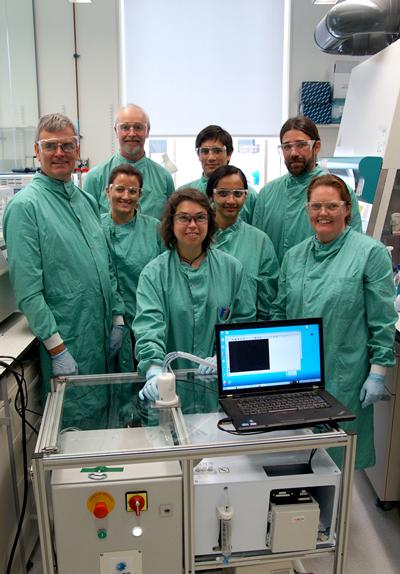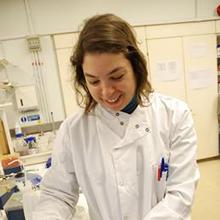New sensor to detect harmful bacteria on food industry surfaces

A new device designed to sample and detect foodborne bacteria is being trialled by scientists at the University of Southampton.
The Biolisme project is using research from the University to develop a sensor capable of collecting and detecting Listeria monocytogenes on food industry surfaces, thereby preventing contaminated products from entering the market.
Listeria monocytogenes is a pathogen that causes listeriosis, an infection with symptoms of fever, vomiting and diarrhoea, that can spread to other parts of the body and lead to more serious complications, like meningitis.
Transmitted by ready-to-eat foods, such as milk, cheese, vegetables, raw and smoked fish, meat and cold cuts, Listeria monocytogenes has the highest hospitalisation (92 per cent) and death (18 per cent) rate among all foodborne pathogens. Listeriosis mainly affects pregnant women, new-born children, the elderly and people with weakened immune systems.
Current techniques to detect the bacteria take days of testing in labs, but the new device aims to collect and detect the pathogen on location within three to four hours. This early and rapid detection can avoid the cross contamination of ready-to-eat food products.

Traditional methods of testing, where sample cells are cultivated in labs, are also flawed. ‘Stressed' cells will not grow in cultures (and will therefore produce negative results) despite the bacteria being present, live and potentially harmful.
Alternative techniques, based on molecular methods, will detect all cell types, but don't differentiate between live and harmless dead cells, which can remain after disinfection.
The new device is designed to sample single cells and biofilms - groups of microorganisms where cells stick together on surfaces. Compressed air and water is used to remove the cells before they are introduced to an antibody. If Listeria monocytogenes is present, cells react with the antibody to produce a florescent signal, which is detected by a special camera.
Doctor Salomé Gião and Professor Bill Keevil from Southampton's Centre for Biological Science Unit have been studying Listeria monocytogenes biofilms under different conditions and will be testing the new prototype. "We researched biofilms under different stresses to find the optimum pressure to remove cells from different surfaces, without disrupting the cells themselves," says Dr Gião. "We also found that biofilms can form on surfaces even if they are covered in tap water.
"The scientific research we have carried out at the University of Southampton has been used by our Biolisme project partners to develop a device which will have major implications for the food industry. By making the process simpler we hope that testing will be conducted more frequently, thereby reducing the chance of infected food having to be recalled or making its way to the consumer."
The prototype sensor has been finalised in France and field trials are now underway to test the device before it is demonstrated in food factories.
José Belenguer Ballester, from project partner ainia centro tecnológico, added: "Biolisme has raised the expectations of food business operators because the devices being developed will allow rapid assessment of the cleanliness of manufacturing plants."
The Biolisme project was started in 2009 by a consortium of six partners from four different countries and is funded by the EU's Seventh Framework Programme for Research (FP7).
Related Staff Member
Related Staff Member
Other University of Southampton sites
Links to external websites
The University cannot accept responsibility for external websites.

